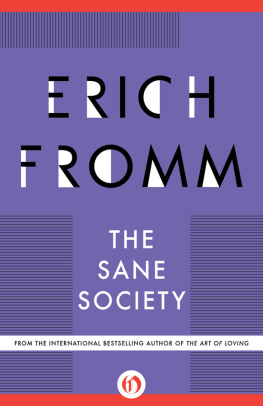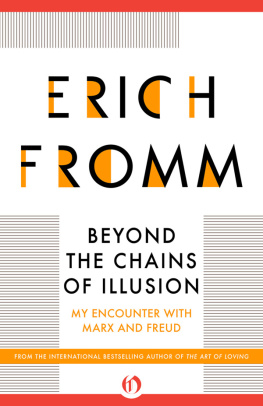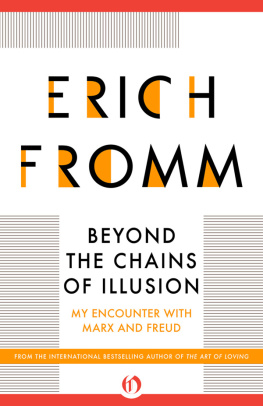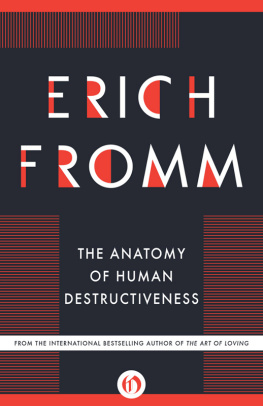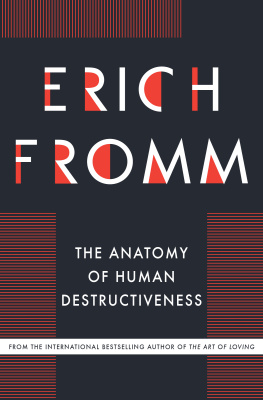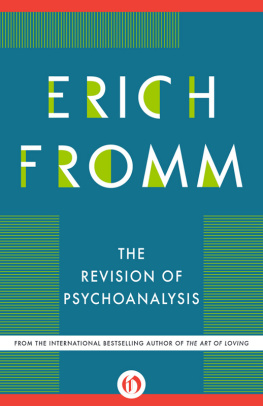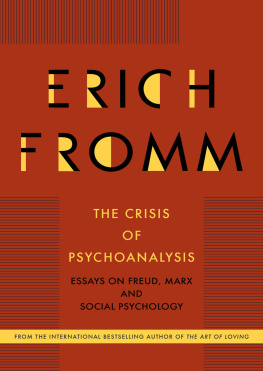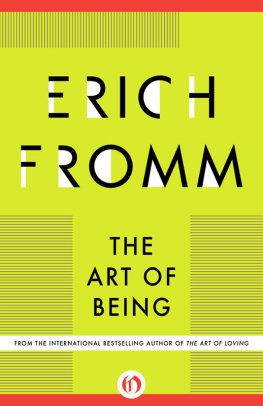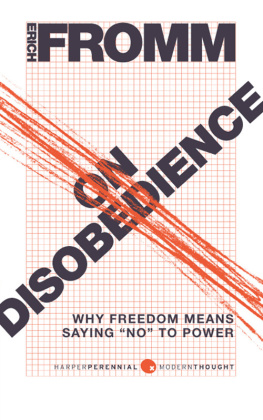
The Sane Society
Erich Fromm

Foreword
This book is a continuation of Escape from Freedom, written over fifteen years ago. In Escape from Freedom I tried to show that the totalitarian movements appealed to a deep-seated craving to escape from the freedom man had achieved in the modern world; that modern man, free from medieval ties, was not free to build a meaningful life based on reason and love, hence sought new security in submission to a leader, race or state.
In The Sane Society I try to show that life in twentieth-century Democracy constitutes in many ways another escape from freedom, and the analysis of this particular escape, centered around the concept of alienation, constitutes a good part of this book.
In another way too, is The Sane Society a continuation of Escape from Freedom, and to some extent, of Man for Himself. In both books I have treated specific psychological mechanism, as far as it seemed pertinent to the main topic. In Escape from Freedom, I dealt mainly with the problem of the authoritarian character (sadism, masochism, etc.). In Man for Himself I developed the idea of various character orientations, substituting for the Freudian scheme of libido development one of the evolution of character in interpersonal terms. In The Sane Society I have tried to develop more systematically the basic concepts of what I have called here humanistic psychoanalysis. Quite naturally, older ideas expressed earlier could not be omitted; but I tried to treat them more briefly and to give more space to those aspects which are the result of my observations and thoughts in the last years.
I hope the reader of my previous books will have no difficulty in seeing the continuity of thought, as well as some changes, leading to the main thesis of humanistic psychoanalysis: that the basic passions of man are not rooted in his instinctive needs, but in the specific conditions of human existence, in the need to find a new relatedness to man and nature after having lost the primary relatedness of the pre-human stage. While in this respect my ideas differ essentially from those of Freud, they are nevertheless based on his fundamental findings, carried further under the influence of ideas and experiences of a generation standing on Freuds shoulders. But just because of the implicit and explicit criticism of Freud contained in these pages, I want to state very clearly that I see great dangers in the development of certain trends in psychoanalysis which, while criticizing certain errors in Freuds system, relinquish with the errors also the most valuable parts of Freuds teaching: his scientific method, his evolutionary concept, his concept of the unconscious as a truly irrational force rather than as a sum total of erroneous ideas. Furthermore, there is danger that psychoanalysis loses another fundamental trait of Freudian thinking, the courage to defy common sense and public opinion.
Eventually, The Sane Society proceeds from the purely critical analysis presented in Escape from Freedom, to concrete suggestions for the functioning of a Sane Society. The main point in this last part of the book is not so much the belief that each one of the recommended measures is necessarily right, but that progress can only occur when changes are made simultaneously in the economic, socio-political and cultural spheres; that any progress restricted to one sphere is destructive to progress in all spheres.
I am deeply indebted to a number of friends who have been helpful to me by reading the manuscript and expressing constructive suggestions and criticism. Specifically I want to mention only one of them, George Fuchs, who died during the time I was working on this book. Originally we had planned to write the book together, but due to his prolonged illness, this plan could not be carried out. His help, however, was considerable. We had lengthy discussions, and he wrote me many letters and memos, especially with regard to problems of socialist theory, which helped to clarify and sometimes to revise my own ideas. I have mentioned his name in the text a few times, but my obligation to him goes much further than these specific references might indicate.
I want to express my thanks to Dr. G. R. Hargreaves, Chief of the Mental Health Section of the World Health Organization, for his help in securing the data on alcoholism, suicide and homicide.
E. F.
And he shall judge among many people, and rebuke strong nations afar off; and they shall beat their swords into plowshares, and their spears into pruning hooks: nation shall not lift up a sword against nation, neither shall they learn war any more.
But they shall sit every man under his vine and under his fig tree; and none shall make them afraid: for the mouth of the Lord of hosts hath spoken it.
MICAH
There exists no more difficult art than living. For other arts and sciences, numerous teachers are to be found everywhere. Even young people believe that they have acquired these in such a way, that they can teach them to others: throughout the whole of life, one must continue to learn to live and, what will amaze you even more, throughout life one must learn to die.
SENECA
This world and yonder world are incessantly giving birth: every cause is a mother, its effect the child.
When the effect is born, it too becomes a cause and gives birth to wondrous effects.
These causes are generation on generation, but it needs a very well lighted eye to see the links in their chain.
RUMI
Things are in the saddle and ride mankind.
EMERSON
The human race had the wisdom to create science and art; why should it not be capable to create a world of justice, brotherliness and peace? The human race has produced Plato, Homer, Shakespeare, and Hugo, Michelangelo and Beethoven, Pascal and Newton, all these human heroes whose genius is only the contact with the fundamental truths, with the innermost essence of the universe. Why then should the same race not produce those leaders capable of leading it to those forms of communal life which are closest to the lives and the harmony of the universe?
LEON BLUM
1 Are We Sane?
Nothing is more common than the idea that we, the people living in the Western world of the twentieth century, are eminently sane. Even the fact that a great number of individuals in our midst suffer from more or less severe forms of mental illness produces little doubt with respect to the general standard of our mental health. We are sure that by introducing better methods of mental hygiene we shall improve still further the state of our mental health, and as far as individual mental disturbances are concerned, we look at them as strictly individual incidents, perhaps with some amazement that so many of these incidents should occur in a culture which is supposedly so sane.
Can we be so sure that we are not deceiving ourselves? Many an inmate of an insane asylum is convinced that everybody else is crazy, except himself. Many a severe neurotic believes that his compulsive rituals or his hysterical outbursts are normal reactions to somewhat abnormal circumstances. What about ourselves?
Let us, in good psychiatric fashion, look at the facts. In the last one hundred years we, in the Western world, have created a greater material wealth than any other society in the history of the human race. Yet we have managed to kill off millions of our population in an arrangement which we call war. Aside from smaller wars, we had larger ones in 1870, 1914 and 1939. During these wars, every participant firmly believed that he was fighting in his self-defense, for his honor, or that he was backed up by God. The groups with whom one is at war are, often from one day to the next, looked upon as cruel, irrational fiends, whom one must defeat to save the world from evil. But a few years after the mutual slaughter is over, the enemies of yesterday are our friends, the friends of yesterday our enemies, and again in full seriousness we begin to paint them with appropriate colors of black and white. At this moment, in the year 1955, we are prepared for a mass slaughter which would, if it came to pass, surpass any slaughter the human race has arranged so far. One of the greatest discoveries in the field of natural science is prepared for this purpose. Everybody is looking with a mixture of confidence and apprehension to the statesmen of the various peoples, ready to heap all praise on them if they succeed in avoiding a war, and ignoring the fact that it is only these very statesmen who ever cause a war, usually not even through their bad intentions, but by their unreasonable mismanagement of the affairs entrusted to them.
Next page
